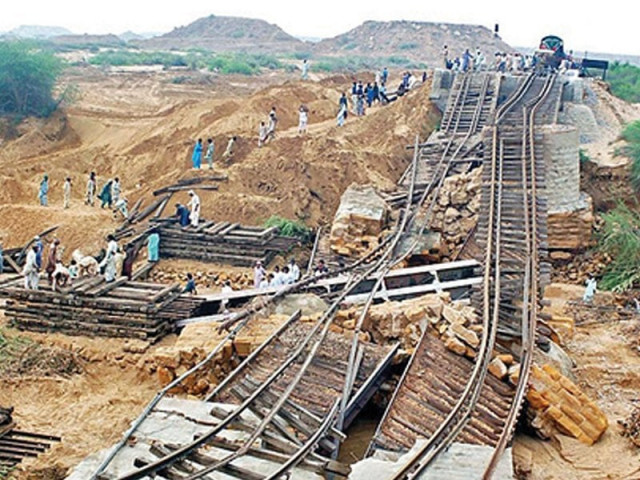Building on ties: New premier indicates plan to link Gwadar with China
Says implementation of an expansive rail network is in the offing to help connect mainland China to Gawadar port.

The successful implementation of the Gwadar-Khunjerab-Kashgar rail network will help China secure oil supply and commercial routes on the Indian Ocean and provide a major boost to Pakistan’s sinking economy. PHOTO: FILE
Newly-elected Prime Minister Mian Muhammad Nawaz Sharif, in his maiden speech, revealed that Islamabad and Beijing have expressed a keen desire to implement the Gwadar-Khunjerab-Kashgar rail network. The project had been discussed during talks with Chinese Premier Li Keqiang in his recent visit to Pakistan.
While PM Sharif said the actual details of the project would be shared at a later date, he also stated that both countries will soon establish a taskforce to complete the project within the next five years, indicating that it may be implemented on a fast-track basis.
The successful implementation of the Gwadar-Khunjerab-Kashgar rail network will help China secure oil supply and commercial routes on the Indian Ocean, furthering its plans to secure yet another strategic energy and trade corridor. Besides, the project is expected to provide a major boost to Pakistan’s sinking economy.
The project is part of China’s ‘Strings of Pearl’ strategic initiative, under which the economic giant wants to secure maritime centres in Pakistan, Sri Lanka, Bangladesh, Maldives and Somalia. The plan highlights China’s growing influence on the region’s ports and airfields. The previous government has already handed over administrative control of the port to China.
The project, which will root Gawadar as a nexus point connecting the West with Central China, was the only scheme mentioned by the new premier in his first speech, and seems close to his stated vision of building mega-projects. It also indicates the new government’s desire to receive economic benefits from the world’s second-largest economy.
Notwithstanding successive governments’ amenability to the Chinese cause, the implementation of the project, originally conceived over a decade ago, is dependent upon Pakistan’s ability to overpower regional and international forces working against it.
The United States and the United Kingdom are trying to keep a check on China’s increasing interests in the Indian Ocean through Bahrain and Dubai, insiders say. The western powers are reportedly offering a New Silk Route alternative to lure Pakistan away from China’s ‘friendly’ grasp.
“Some countries are not happy with the Pakistan-China relationship, and Pakistan will have to make inroads through diplomacy alone,” observed Akram Zaki, a former diplomat and an expert on Pakistan-China relations. He said the Gwadar-Kashgar project will increase China’s stake in Pakistan’s security, besides the economic dividends of the project.
More importantly, the success of the project depends on China’s resolve to finance it: the actual cost is yet to be determined, but 2005 estimates showed it over $10 billion.
“The project was conceived many years ago, but it was not pursued actively in the past,” Tariq Puri, former executive director of the Trade Development Authority of Pakistan, told The Express Tribune. Puri had been part of a delegation that visited Urumqi and Kashgar and reviewed the possibility of implementing this project.
The project will route Chinese goods destined for the Middle East and other global destinations from Urumqi through Gwadar. It will save the Chinese half of their current voyage time and secure their oil supplies and commercial routes. The distance from Dubai to Khunjerab is 3,300 miles; the distance from Dubai to Shanghai via the Indian Ocean is about 9,000 miles.
“China will be gaining virtual control of the Indian Ocean and the energy and trade corridor from the Gulf,” Puri said. He said China’s plans also provide a trade opportunity to Pakistan, as the northern neighbour will be the next big consumer market for Pakistani products in the coming years.
According to an official of the Planning Commission, such a major investment will create thousands of jobs, besides boosting economic growth and bringing in prosperity in Balochistan, a historically underdeveloped province. Pakistan will also receive a transit fee for all goods passing through its territories. However, the project’s implementation is not without economic and political costs: Pakistan is solely dependent on China for the construction of the rail network, as its cost runs higher than that of the Diamer Basha Dam.
Published in The Express Tribune, June 6th, 2013.
Like Business on Facebook to stay informed and join in the conversation.


















COMMENTS
Comments are moderated and generally will be posted if they are on-topic and not abusive.
For more information, please see our Comments FAQ